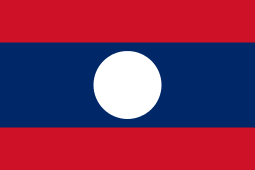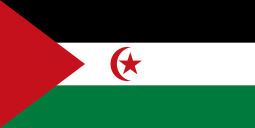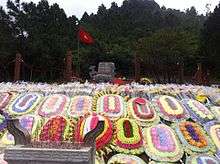Death and state funeral of Võ Nguyên Giáp
General Võ Nguyên Giáp, who led the Viet Minh forces during the First Indochina War and the North Vietnamese forces during the Vietnam War, died on October 4, 2013, after a long stay at the 108 Hospital in Hanoi. The official Vietnamese news agency did not officially confirm it until a day later,[1] when they announced a two-day national funeral to be held the following week, on October 12 and 13, which would be presided by all the top government officials. His body laid in state at the National Funeral House in Hanoi on October 12, before being buried in his home province of Quang Binh the following day.[2] His funeral was broadcast live nationwide by the state broadcasters, VTV and VOV.
Death
Giap was hospitalized at the 108 Hospital in 2009. After his 100th birthday, Giap's health deteriorated as he slowly lost the ability to both speak and walk. In 2011, VTV showed footage of him voting (from a wheelchair) to dispel rumors of his failing health. At 6:09 PM on October 4, 2013, he died after a four-year stay at the hospital, at the age of 102. According to East Asian age reckoning, he was 103.
Reactions
Domestic

In Vietnam, news of Giap's death spread quickly through social media, especially through Facebook, before the government-controlled media began to pick it up.[1] VnExpress, an online newspaper, reported the news more than four hours later, and domestic media began to report the story. However, before an official acknowledgement from the government, the media could only briefly mention the news without any commentary.[1]
Fully one day later, the official news agency acknowledged the news that Giap was dead and announced a national funeral. There was an immediate outpouring of grief in the country where he is highly revered and many people regard him as second only to Ho Chi Minh. His family opened his residence for visitations and hundreds of thousands of people came to pay their respects before the official funeral.
International
-
 Brazil: President of Brazil Dilma Rousseff sent condolences to President of Vietnam Truong Tan Sang.
Brazil: President of Brazil Dilma Rousseff sent condolences to President of Vietnam Truong Tan Sang. -
 Cuba: President Raúl Castro expressed his condolences to the people of Vietnam and said that "the Cuban people will always remember, with admiration and respect, the figure of General Giap and our Revolutionary Armed Forces for their invaluable contribution to the Cuban military doctrine."[3]
Cuba: President Raúl Castro expressed his condolences to the people of Vietnam and said that "the Cuban people will always remember, with admiration and respect, the figure of General Giap and our Revolutionary Armed Forces for their invaluable contribution to the Cuban military doctrine."[3] -
 France: Foreign Minister Laurent Fabius praised Giap: "I am saddened to learn of the death of General Giap. He was a great Vietnamese patriot, loved and respected by all his people and for the prominent role he played in founding the independence of his country."[4]
France: Foreign Minister Laurent Fabius praised Giap: "I am saddened to learn of the death of General Giap. He was a great Vietnamese patriot, loved and respected by all his people and for the prominent role he played in founding the independence of his country."[4] -
 Democratic People's Republic of Korea: President of the Presidium of the DPRK Supreme People's Assembly Kim Yong Nam sent a message of condolence to the funeral commission. The message stressed that Giap "was a prominent state and political activist devoted his all to the national liberation struggle and cause of socialism in Vietnam from his early years true to the intention of President Ho Chi Minh and close friend of the Korean people made a contribution to the friendly and cooperative relations between the DPRK and Vietnam."[5]
Democratic People's Republic of Korea: President of the Presidium of the DPRK Supreme People's Assembly Kim Yong Nam sent a message of condolence to the funeral commission. The message stressed that Giap "was a prominent state and political activist devoted his all to the national liberation struggle and cause of socialism in Vietnam from his early years true to the intention of President Ho Chi Minh and close friend of the Korean people made a contribution to the friendly and cooperative relations between the DPRK and Vietnam."[5] -
 Laos: The Lao People's Revolutionary Party Central Committee, National Assembly, and government, sent their messages of condolences to their Vietnamese counterparts. The message read that "the general tirelessly devoted his wisdom and energy to throwing off the yoke of foreign colonialism" and that "[h]e contributed significantly to enriching the friendly relations, special solidarity and comprehensive cooperation between Laos and Vietnam."[6]
Laos: The Lao People's Revolutionary Party Central Committee, National Assembly, and government, sent their messages of condolences to their Vietnamese counterparts. The message read that "the general tirelessly devoted his wisdom and energy to throwing off the yoke of foreign colonialism" and that "[h]e contributed significantly to enriching the friendly relations, special solidarity and comprehensive cooperation between Laos and Vietnam."[6] -
 Nicaragua: First Lady Rosario Murillo expressed her condolences on behalf of the people of Nicaragua.[7]
Nicaragua: First Lady Rosario Murillo expressed her condolences on behalf of the people of Nicaragua.[7] -
 Sahrawi Republic: President Mohamed Abdelaziz sent a letter of condolences to Vietnamese President Truong Tan Sang on behalf of the government and people of the Sahrawi Republic, remembering also the January 1976 meeting in Algeria between General Giap and POLISARIO founder El-Ouali Mustapha Sayed, an encounter which embodied the "strong solidarity between the Sahrawi and Vietnamese people in their common fight against foreign domination and occupation.".[8]
Sahrawi Republic: President Mohamed Abdelaziz sent a letter of condolences to Vietnamese President Truong Tan Sang on behalf of the government and people of the Sahrawi Republic, remembering also the January 1976 meeting in Algeria between General Giap and POLISARIO founder El-Ouali Mustapha Sayed, an encounter which embodied the "strong solidarity between the Sahrawi and Vietnamese people in their common fight against foreign domination and occupation.".[8] -
 Singapore: The government of Singapore said that it was saddened by the death of Vo Nguyen Giap and that he "played a pivotal role in Vietnam's fight for independence."[9][10]
Singapore: The government of Singapore said that it was saddened by the death of Vo Nguyen Giap and that he "played a pivotal role in Vietnam's fight for independence."[9][10] -
 Venezuela: President Nicolas Maduro expressed his condolences for the death of General Vo Nguyen Giap, who "fought tirelessly against the yoke of the colonizer, both French and American, which for years curtailed the freedom of the Vietnamese people."[11]
Venezuela: President Nicolas Maduro expressed his condolences for the death of General Vo Nguyen Giap, who "fought tirelessly against the yoke of the colonizer, both French and American, which for years curtailed the freedom of the Vietnamese people."[11]
National funeral
Immediately after news of Giáp's death spread but before it was officially acknowledged, there was widespread speculation about the nature of his funeral.[12] According to current regulations, only people holding or having held the top positions of general secretary, president, prime minister, or chairman of the National Assembly are entitled to a national funeral (quốc tang).[12] Võ Nguyên Giáp, who was a former Politburo member and a former deputy prime minister, was automatically be entitled to a state funeral (lễ tang cấp nhà nước). However, protocols do allow for exceptions when the deceased's stature is higher than their official position.
Upon acknowledging General Giáp's death, the government announced plans for a national funeral to be held on October 12 and 13. The Funeral Committee consisted of 30 people, headed by General Sectetary Nguyễn Phú Trọng.[13] The National Funeral Arrangements Committee, headed by deputy prime minister and Politburo member Nguyễn Xuân Phúc, was tasked with making the arrangements for the funeral and burial ceremonies. General Giap's body lied in state at the National Funeral Hall, where mourners could pay their respect beginning on October 12. While the main ceremony took place in Hanoi, simultaneous memorials were also held at the Reunification Palace in Ho Chi Minh City and the Provincial People's Committee Office in Quảng Bình, his home province. Immediately after the funeral ceremony on October 13, his body was flown to Quảng Bình, where he was buried in Vũng Chùa - Đảo Yến, a location near the coast.[14] As his resting place is at a remote location, workers had to work quickly to pave the road to facilitate the burial.[15]

References
- 1 2 3 "Facebook trumps state media as Vietnam mourns General Giap". AFP. 2013-10-06. Retrieved 2013-10-06.
- ↑ AFP (2013-10-07). "Vietnam honours military genius Vo Nguyen Giap who beat France, US". The Australian.
- ↑ Raúl Castro (2013-10-05). "Envía Raúl mensaje de condolencias al pueblo vietnamita". Radio Cubana. Retrieved 2013-10-07.
- ↑ AFP (2013-10-05). "Fabius salue en Giap "un grand patriote vietnamien"". Liberation. Retrieved 2013-10-07.
- ↑ "Condolences to Late Former Vietnamese Minister of Defence". KCNA. 2013-10-11. Retrieved 2013-10-12.
- ↑ Times Reporters (2013-10-08). "Lao officials send condolences to Vietnamese counterparts". Vientiane Times. Retrieved 2013-10-08.
- ↑ "Nicaragua lamenta fallecimiento del General Vo Nguyen Giap". Radio Nicaragua. 2013-10-04. Retrieved 2013-10-08.
- ↑ "President of Republic condoles Vietnamese people on death of General Giap". SPS. 5 October 2013. Retrieved 11 December 2013.
- ↑ "Singapore govt saddened by death of Vietnam's General Giap". Channel News Asia. 2013-10-06. Retrieved 2013-10-07.
- ↑ Ministry of Foreign Affairs of Singapore (2013-10-04). "MFA Press Statement: Passing of Vietnam General Vo Nguyen Giap, 4 October 2013". Retrieved 2013-10-08.
- ↑ Yvke Mundia (2013-10-05). "Venezuela manifiesta su condolencia por fallecimiento de Vo Nguyen Giap". Radio Mundial. Retrieved 2013-10-07.
- 1 2 Hoang Luc (2013-10-05). "Cử hành lễ tang Đại tướng Võ Nguyên Giáp theo nghi lễ nào?". Giáo dục Việt Nam. Retrieved 2013-10-06.
- ↑ "State funeral for legendary General Vo Nguyen Giap". Tuoi Tre News. 2013-10-06. Retrieved 2013-10-07.
- ↑ Lam Giang (2013-10-08). "An táng Đại tướng ở Vũng Chùa - đảo Yến". Tuoi Tre.
- ↑ Đức Tài (2013-10-09). "Bí thư Quảng Bình: "Vũng Chùa - Đảo Yến là nơi rất đẹp"". Dan Tri.